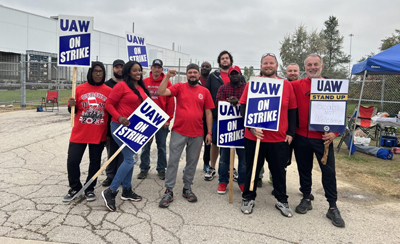About 3,800 employees are laid off across the U.S. auto industry as a result of the strike.
On Oct. 2, three days after the United Auto Workers announced its Stand Up strike would expand to include more workers at Ford and GM plants in Chicago and Michigan, both automakers said they would have to lay off employees in response.
According to the Detroit Free Press, GM said it began laying off 164 workers at two facilities in Ohio and Indiana on Oct. 2, while Ford said it has laid off 330 workers at its Chicago Assembly Plant and its Lima Engine Plant in Ohio.
There are now 930 Ford employees who have been laid off due to the strike, including the 600 announced Sept. 15 at the Michigan Assembly Plant.
GM on Sept. 20 laid off nearly 2,000 workers at its idled Fairfax Assembly Plant in Kansas City, KS.
Between GM, Ford and Stellantis---which did not see calls to expand the strike in any of its facilities on Sept. 29 due to progress made in bargaining---there are about 3,800 employees laid off across the U.S. auto industry as a result of the strike.
GM on Oct. 2 also said it had received that day a counteroffer from the UAW on the proposal GM had given it Sept. 21. A GM spokesman said only the automaker was assessing the counteroffer, "but significant gaps remain," according to the Detroit Free Press.
In a news release, Ford said it made an offer to the UAW the evening of Oct. 2, the seventh and strongest offer it has made since Aug. 29. The latest offer provides the brand's 57,000 UAW-represented employees with a record contract, and includes unprecedented improvements in wages and benefits, product commitments for every UAW factory and job security, while preserving Ford’s ability to invest and grow.
The union has taken a hard line on battery plants. Ford said it remains open to the possibility of working with the UAW on future battery plants, but "these are multi-billion-dollar investments and must operate at competitive and sustainable levels."
"As Ford has made clear, none of our employees, including powertrain employees, will lose their jobs due to our battery plants during this contract period," Ford said. "In fact, for the foreseeable future, we will have to hire more workers as some workers retire, in order to keep up with demand for our ICE products."












